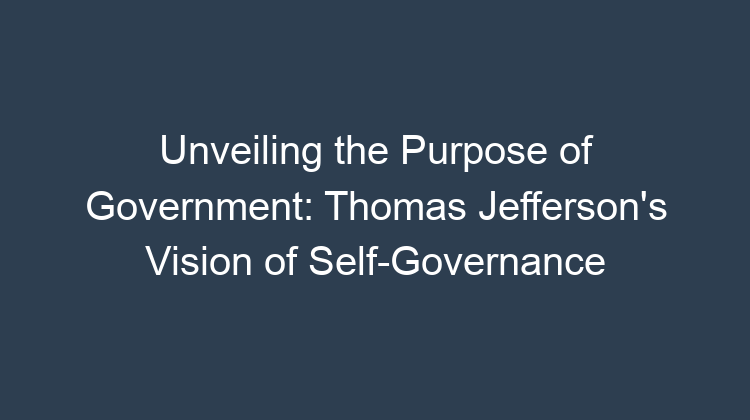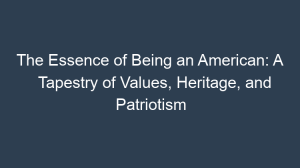In the annals of American history, few names carry the weight and significance of Thomas Jefferson, the third President of the United States. Celebrated as a beacon of democracy, Jefferson’s legacy extends far beyond his political achievements, his ideals and philosophies continue to shape the very fabric of American society and government. Central to his vision was a firm belief in the purpose of government, one that sought to safeguard the rights and liberties of citizens while simultaneously promoting their well-being.
Jefferson’s perspective on the role of government was deeply rooted in his belief in the sovereignty of the people. He held that governments were not entities separate from the people they served but rather were instruments created by the people to protect their rights. This conviction drove his insistence that governments must be limited in their powers, bound by the restrictions outlined in the Constitution and subject to the oversight of the citizenry. Only through such limitations could individual liberty and freedom be preserved.
Beyond safeguarding individual rights, Jefferson believed that governments had a responsibility to promote the common good. He envisioned a government that would foster education, encourage economic opportunity, and ensure equal access to justice. This vision of an active government was predicated on the principle that a healthy and prosperous society requires the collective participation of its members. Accordingly, he advocated for policies that would invest in infrastructure, education, and social programs, all aimed at enhancing the well-being of the people.
H2: The Roots of Jefferson’s Philosophy
Jefferson’s Debt to Enlightenment Thinkers:
Jefferson’s ideas on government were not born in isolation. He drew inspiration from a constellation of Enlightenment thinkers, whose writings profoundly shaped his political ideology. Philosophers like John Locke and Montesquieu argued for the importance of individual rights, limited government, and the separation of powers, all concepts that resonated deeply with Jefferson.
The American Revolution: A Crucible of Ideas:
The American Revolution served as a crucible that tested and refined Jefferson’s beliefs. As a delegate to the Continental Congress and a principal author of the Declaration of Independence, Jefferson played a pivotal role in articulating the ideals upon which a new nation would be founded. These ideals, rooted in the principles of liberty, equality, and self-governance, became the cornerstone of his vision for the American government.
H2: Jefferson’s Legacy: Enduring Principles and Ongoing Debates
A Beacon of Limited Government:
Jefferson’s enduring legacy lies in his staunch adherence to limited government. He believed that a government that wields excessive power poses a threat to individual liberty and the pursuit of happiness. His writings and speeches consistently emphasized the importance of checks and balances, a separation of powers, and a vigilant citizenry to prevent governmental overreach.
The Role of Government in Promoting the Common Good:
Jefferson’s emphasis on the common good has left a lasting mark on American policy. His belief that government has a responsibility to ensure the well-being of its citizens has inspired policies ranging from public education to social welfare programs. While the scope and scale of these policies have been debated throughout history, the principle of collective responsibility remains a central tenet of American governance.
H2: Government’s Relationship with the People
A Government ‘Of the People, By the People, For the People’:
Jefferson’s vision of government was inextricably linked to the concept of popular sovereignty. He believed that government derives its legitimacy from the consent of the governed and that the people have the right to alter or abolish a government that no longer serves their interests. This principle has been instrumental in shaping democratic processes such as elections and referendums.
The Importance of Civic Engagement:
Jefferson recognized that self-government requires an active and engaged citizenry. He urged citizens to participate in the political process, to hold their elected officials accountable, and to defend their rights and liberties. This call for civic engagement remains essential for maintaining a healthy and vibrant democracy.
H2: Government’s Role in Protecting Rights and Liberties
The Bill of Rights: A Bulwark of Liberty:
Jefferson’s belief in the importance of individual rights is enshrined in the Bill of Rights, the first ten amendments to the U.S. Constitution. These amendments guarantee fundamental freedoms such as freedom of speech, religion, and assembly, as well as the right to bear arms and to a fair trial. The Bill of Rights stands as a testament to Jefferson’s commitment to protecting the rights of individuals against government encroachment.
The Struggle for Equality:
Jefferson’s legacy is also intertwined with the struggle for equality. While his views on slavery were complex and evolving, his writings and actions contributed to the abolitionist movement. He recognized the hypocrisy of a nation founded on the principles of liberty and equality while condoning slavery, and his words and deeds helped pave the way for the eventual abolition of this abhorrent institution.
H2: Government’s Role in Economics and Infrastructure
Promoting Economic Opportunity:
Jefferson believed that government has a role to play in promoting economic opportunity and fostering a healthy economy. He supported policies that encouraged agriculture, trade, and manufacturing. He also recognized the importance of infrastructure in facilitating economic growth and connecting communities.
Investing in Infrastructure:
Jefferson was a strong advocate for investing in infrastructure, such as roads, canals, and bridges. He believed that these investments were essential for economic development and would improve the lives of ordinary citizens. His vision laid the foundation for the extensive infrastructure network that exists in the United States today.
H2: FAQ
Q3: What was Jefferson’s view on the relationship between the government and the people?
A: Jefferson believed that government derives its legitimacy from the consent of the governed and that the people have the right to alter or abolish a government that no longer serves their interests.
Q4: How did Jefferson’s views on government influence the American Revolution?
A: Jefferson played a pivotal role in articulating the ideals of liberty, equality, and self-governance that became the foundation of the American Revolution. His writings and speeches helped rally support for independence and shape the principles upon which the new nation would be founded.
Q5: What was Jefferson’s stance on slavery?
A: Jefferson’s views on slavery were complex and evolving. While he personally owned slaves, he recognized the hypocrisy of a nation founded on the principles of liberty and equality while condoning slavery. His writings and actions contributed to the abolitionist movement and helped pave the way for the eventual abolition of slavery.
H2: Conclusion
Thomas Jefferson’s vision of government remains a beacon of liberty, equality, and self-governance. His belief that government exists to protect the rights and promote the well-being of the people has shaped the very fabric of American democracy. Throughout history, Jefferson’s ideals have inspired generations of leaders and activists to fight for justice, equality, and the preservation of individual liberties. As we navigate the complexities of the 21st century, Jefferson’s wisdom continues to offer guidance on the fundamental role of government in safeguarding our freedoms and ensuring the flourishing of our society.







